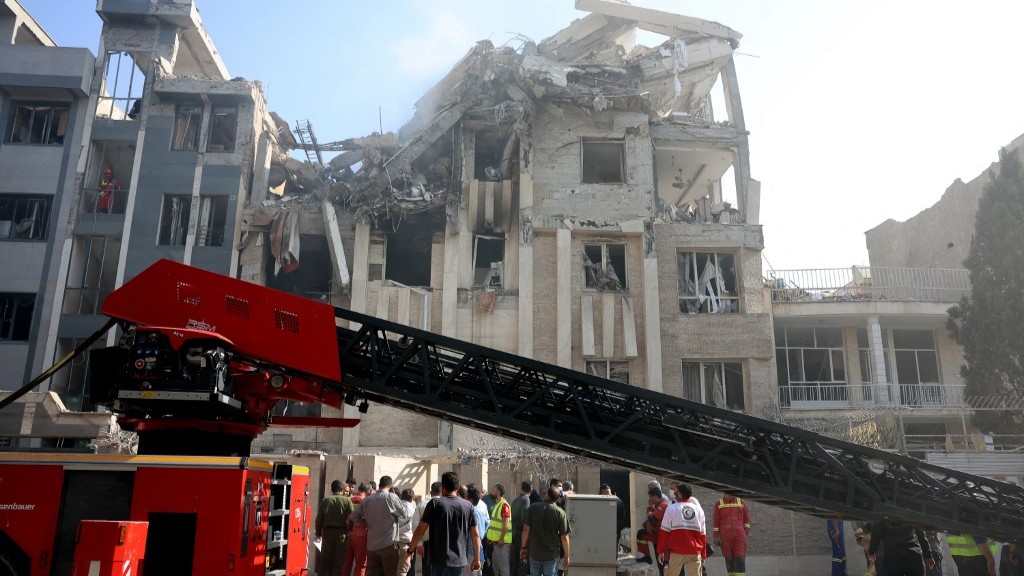Israel’s attack on Iran in the early hours of Friday marks the most severe attack on the Islamic Republic since the end of the Iran-Iraq war in 1988.
International observers, analysts, energy monitors, politicians and ordinary people in Iran and Israel are still scrabbling to come to terms with the significance of the operation, branded “Rising Lion” by Israel.
The fear among regional leaders, in particular, is that the escalation of the conflict between the two longstanding rivals could draw in neighbouring countries.
Meanwhile, the International Atomic Energy Agency (IAEA) has expressed concern over potential radioactive contamination as a result of the strikes on nuclear facilities.
With events still unfolding, Middle East Eye takes a look at what we know so far.
New MEE newsletter: Jerusalem Dispatch
Sign up to get the latest insights and analysis on
Israel-Palestine, alongside Turkey Unpacked and other MEE newsletters
What happened?
At around 3.30am local time (12am GMT) on Friday, explosions were heard around Tehran, as the first Israeli barrage struck the capital.
State TV said residential areas were hit, with blasts also heard northeast of the capital.
The Israeli military said it had targeted “dozens of military targets, including nuclear targets in different areas of Iran”.
Hours later, an explosion was reported at the Natanz nuclear facility, about 225km south of the capital, with the IAEA confirming it had been struck.
In response, Iran launched around 100 drones at Israel, which were reportedly intercepted.
Hours later, a further attack was reported by Iranian state media on the northwestern city of Tabriz.
The US has described the attacks as “unilateral” and said it was not involved.
Who has been killed?
Israel’s attack has killed a range of senior military figures and nuclear scientists, as well as a number of civilians, who state media said included women and children.

Who are the Iranian military chiefs and scientists killed by Israel?
Read More »
Military leaders killed included the Islamic Revolutionary Guard Corps (IRGC) chief Hossein Salami, Chief of Staff of the Armed Forces Mohammad Bagheri, and IRGC Major-General Gholam Ali Rashid.
State media said nuclear scientist Fereydoon Abbasi-Davani was killed along with his wife and child, as were Abdulhamid Minouchehr, a faculty member and dean of the Faculty of Nuclear Engineering at Shahid Beheshti University, and Ahmadreza Zolfaghari, a professor at the same department.
The Israeli army later announced it had also killed IRGC Aerospace Force Commander Amir Ali Hajizadeh, along with UAV Force Commander Taher-pour, Aerial Command Commander Davoud Shaykhian.
How did we get here
Israel has long expressed alarm about the development of Iran’s nuclear programme, which the Islamic Republic has been working on for decades.
Although the Iranian government says it is only developing its nuclear capabilities for peaceful purposes, Israel and the US accuse the country of trying to develop nuclear weapons.

UK not defending Israel against Iran’s drone attack, government says
Read More »
In 2018, US President Donald Trump withdrew from the Joint Comprehensive Plan of Action (JCPOA) that his predecessor Barack Obama had negotiated with Iran to limit the country’s nuclear programme.
Both Trump’s successor, Joe Biden, and Trump himself, now again in office, have attempted to restart negotiations towards another deal with Iran over its nuclear programme.
Though talks between the Trump administration and Iran are nominally ongoing this week, there has been little indication of success. On Thursday, the IAEA said Iran was in a state of “non-compliance with its obligations” under its international agreements.
Israeli Prime Minister Benjamin Netanyahu has been increasingly belligerent in targeting regional leaders he says are backed by Iran since the beginning of the war on Gaza in October 2023, killing Hezbollah leader Hassan Nasrallah and Hamas leader Ismail Haniyeh last year, the latter in the Iranian capital Tehran.
Iran launched two operations last year, in April and October, against Israel in response to their attacks, neither resulting in casualties.
With tensions rising, the US ordered its diplomatic staff to start evacuating bases across the region in recent days.
How has the world responded to the attack?
Trump used the attack as an opportunity to pressure Iran into accepting a deal at talks due to take place on Sunday.
He warned that further attacks on Iran could be “even more brutal”.
“I told them it would be much worse than anything they know, anticipated, or were told, that the United States makes the best and most lethal military equipment anywhere in the World, BY FAR, and that Israel has a lot of it, with much more to come – And they know how to use it,” Trump wrote in a message on Truth Social.

Israel blocks access to Al-Aqsa mosque after Iran strike
Read More »
“Iran must make a deal, before there is nothing left, and save what was once known as the Iranian Empire. No more death, no more destruction, JUST DO IT, BEFORE IT IS TOO LATE. God Bless You All!”
However, the reaction from the rest of the world has largely ranged from muted to condemnation.
Regional leaders Saudi Arabia, Qatar, UAE, Egypt and Turkey all condemned the attack, warning of the potential for escalation.
UN Secretary-General Antonio Guterres said he was “particularly concerned by Israeli attacks on nuclear installations in Iran while talks between Iran and the United States on the status of Iran’s nuclear programme are underway”, comments that have also been echoed by the IAEA.
The UK called for de-escalation, while France and Germany both defended Israel’s “right to defend itself” and also called for de-escalation.
Oil prices surged to over 7 percent on Friday in the aftermath of the attack.
Brent crude futures LCOc1 jumped $5.1, or around 7.4 percent, to $74.46 a barrel by 8.43am GMT after hitting an intraday high of $78.50, the highest since 27 January.
US West Texas Intermediate crude CLc1 was up $5.1, or 7.5 percent, at $73.15 a barrel after hitting a high of $77.62, its highest level since 21 January.


